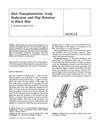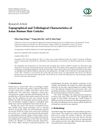27 citations,
November 2007 in “Genomics” Mutations in specific keratin genes cause improper hair structure in mice due to faulty keratin protein assembly.
11 citations,
March 2016 in “Cell cycle/Cell cycle (Georgetown, Tex. Online)” Old hair follicles grew better when moved to a young environment.
 34 citations,
August 1966 in “Experimental cell research”
34 citations,
August 1966 in “Experimental cell research” Keratin fibrils in hair form and stop growing at specific points in the follicle.
[object Object]  7 citations,
July 2011 in “Survey of Ophthalmology”
7 citations,
July 2011 in “Survey of Ophthalmology” The document concludes that periocular hair disorders have various causes and treatments, and proper evaluation by specialists is important for management and prognosis.
 32 citations,
February 1998 in “The journal of investigative dermatology/Journal of investigative dermatology”
32 citations,
February 1998 in “The journal of investigative dermatology/Journal of investigative dermatology” Two specific hair keratin genes are active during hair growth and decline as hair transitions to rest.
 June 2018 in “International journal of trend in scientific research and development”
June 2018 in “International journal of trend in scientific research and development” The review explains how hair products work and the science of different hair types to help improve hair care research.
 January 2025 in “Current Issues in Molecular Biology”
January 2025 in “Current Issues in Molecular Biology” Certain plant extracts may help prevent hair loss and promote hair growth safely.
 7 citations,
May 2005 in “Experimental Dermatology”
7 citations,
May 2005 in “Experimental Dermatology” Two mouse mutations cause similar hair loss despite different skin changes.
 4 citations,
October 2018 in “Experimental Dermatology”
4 citations,
October 2018 in “Experimental Dermatology” Dermoscopy shows that diffuse alopecia areata progresses through specific hair growth stages.

The document concludes that activating hair roots is important for improving hair growth and preventing hair loss.
 21 citations,
January 2017 in “Skin Pharmacology and Physiology”
21 citations,
January 2017 in “Skin Pharmacology and Physiology” Caffeine-based liquid 0.2% is as effective as minoxidil 5% for treating male hair loss.
 8 citations,
January 1986 in “The Journal of Dermatologic Surgery and Oncology”
8 citations,
January 1986 in “The Journal of Dermatologic Surgery and Oncology” Hair loss surgeries like grafts, scalp reductions, and flap rotations can be effective for black men with proper technique adjustments.
 20 citations,
October 2008 in “Archives of dermatological research”
20 citations,
October 2008 in “Archives of dermatological research” Angiogenin helps hair grow by stimulating cell growth and blood vessel formation.
Stem cell treatments show promise for hair loss but need more research.
 2 citations,
March 2023 in “BMC ecology and evolution”
2 citations,
March 2023 in “BMC ecology and evolution” Some hair protein genes evolved early and were adapted for use in hair follicles.
 5 citations,
January 2023 in “International Journal of Molecular Sciences”
5 citations,
January 2023 in “International Journal of Molecular Sciences” Hair follicles could be used to noninvasively monitor our body's internal clock and help identify risks for related diseases.
[object Object] 7 citations,
December 2015 in “PloS one” Cryopreserved mouse whisker follicles can grow hair when transplanted into nude mice.
 2 citations,
July 2022 in “Cell Regeneration”
2 citations,
July 2022 in “Cell Regeneration” Understanding hair growth involves complex factors, and more research is needed to improve treatments for hair loss conditions.
 3 citations,
January 2015 in “Mathematical problems in engineering”
3 citations,
January 2015 in “Mathematical problems in engineering” Hair damage increases significantly with higher temperatures and longer heating times.
 6 citations,
January 2019 in “Journal of Cutaneous and Aesthetic Surgery”
6 citations,
January 2019 in “Journal of Cutaneous and Aesthetic Surgery” Follicular unit extraction is an effective hair transplant method for advanced baldness with high patient satisfaction, but some experienced decreased density over time.
11 citations,
May 2022 in “Chinese medicine” Alpinetin helps grow hair by turning on hair stem cells and is safe for use.
 January 2020 in “Medpulse International Journal of General Medicine/Medpulse International Journal of Medicine”
January 2020 in “Medpulse International Journal of General Medicine/Medpulse International Journal of Medicine” Premature graying of hair is often linked with other health issues, but treatment with biotin, zinc, and calcium pantothenate is not very effective.
 5 citations,
September 2020 in “Molecules”
5 citations,
September 2020 in “Molecules” Extracts from three Polynesian plants were found to promote hair growth by affecting cell growth and gene expression related to hair.
 January 2024 in “International journal of homoeopathic sciences”
January 2024 in “International journal of homoeopathic sciences” Homeopathic treatments can effectively manage hair loss and improve well-being.
 October 2020 in “Journal of Aesthetic Nursing”
October 2020 in “Journal of Aesthetic Nursing” Platelet-rich plasma (PRP) injections effectively treat hair loss and thinning in both men and women, with high satisfaction and no major side effects.
 77 citations,
March 2021 in “Nature”
77 citations,
March 2021 in “Nature” Stress hormone corticosterone blocks a growth factor to slow down hair stem cell activity and hair growth.
 July 2023 in “The Egyptian Journal of Hospital Medicine ”
July 2023 in “The Egyptian Journal of Hospital Medicine ” Alopecia areata is a hair loss condition caused by immune factors and can be treated with JAK inhibitors.
 September 2023 in “International journal of Unani and integrative medicine”
September 2023 in “International journal of Unani and integrative medicine” Hair loss patterns are linked to temperament and can help diagnose it.
 17 citations,
February 2013 in “PLOS ONE”
17 citations,
February 2013 in “PLOS ONE” 6-Gingerol, found in ginger, may slow down hair growth and could be used for hair removal.
 December 2020 in “Journal of Aesthetic Nursing”
December 2020 in “Journal of Aesthetic Nursing” Injecting platelet-rich plasma into the scalp stimulates hair growth, increases hair density, and treats hair loss effectively with minimal side effects.
























